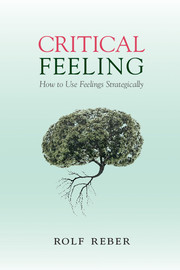3 - Critical feeling
from Part I - The basics of critical feeling
Published online by Cambridge University Press: 05 March 2016
Summary
Men are admitted into Heaven not because they have curbed & govern'd their Passions or have No Passions, but because they have Cultivated their Understandings.
(William Blake 1972/1810, p. 615)What is critical feeling?
In Chapter 1, critical thinking was defined as “reasonable, reflective thinking that is focused on deciding what to believe or do” (Fisher 2011, p. 4). Combining the concise definition of critical thinking with what we know about the rationality of feelings, we can now define critical feeling as the reflective use of feelings that is focused on guiding attention, evaluating information, and guiding action according to the values we like to implement. Feelings we use in critical feeling can be either ends or means. For example, when we want to alleviate fear, we use means to achieve a feeling as an end. When we use feelings as information to evaluate a job applicant or to assess what we know, we use them as means. Sometimes, feelings are used as both ends and means, for example when therapists use feelings connected to relaxation in order to alleviate fear.
According to Ennis (1962), critical thinkers ideally exhibit certain proficiencies such as observing; inferring; generalizing; conceiving and stating assumptions and alternatives; offering a well-organized or well-formulated line of reasoning; evaluating statements and chains of reasoning; and detecting standard problems. Could we find a similar list of proficiencies for critical feeling that supplements the short definition given above? Although there are no rules of feeling like there are rules of logic and rules of inference from empirical evidence, there are some capacities and abilities related to feelings that seem to be advantageous. They are summarized in Table 3.1, with strategies that pertain to the individual proficiencies.
The first proficiency is interrupting feelings. It is certainly adaptive to interrupt feelings that are inappropriate to a situation. Beyond simply suppressing feelings, this includes timeouts, distraction, and stop-and-think rules to calm down affective responses and prevent impulsive action. Another method of interrupting inappropriate feelings is meta-awareness in that people become aware of the fact that, for example, anger is their personal feeling and not an objective feature of the situation. Finally, people may reappraise a situation to not only interrupt but also revise the inappropriate feeling.
- Type
- Chapter
- Information
- Critical FeelingHow to Use Feelings Strategically, pp. 60 - 100Publisher: Cambridge University PressPrint publication year: 2016



